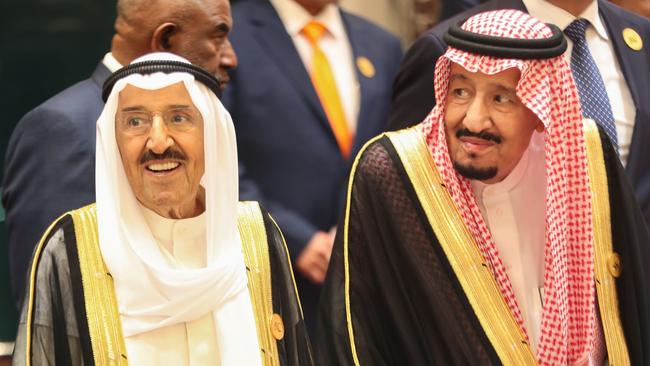Kuwait to face pressure to forge ties with Israel after emir’s death
The Arab Gulf state must balance the US against relations with Iran and pro-Palestinian popular opinion.

For decades, Kuwait has charted a neutral course in many of the Middle East’s intractable conflicts. But the death of its longtime ruler leaves his successor with a dilemma: whether to normalise ties with Israel without statehood for the Palestinians.
Sheik Sabah al-Ahmad al-Jaber al-Sabah, who died on Tuesday, was a veteran diplomat who remained a steadfast supporter of the Palestinians even as Arab backing for their vision of an independent state waned.
The recent US-brokered normalisation of ties between Israel and two Arab Gulf states — the United Arab Emirates and Bahrain — has heaped pressure on others, including Kuwait, to follow suit.
After an Oval Office meeting in Washington earlier in September with Sheik Sabah’s eldest son, a former defence minister who is a leading contender to become the next crown prince, US President Donald Trump said Kuwait would be the next country to forge formal relations with Israel. But a week later at the UN, Kuwait’s Prime Minister reiterated the country’s insistence that peace with the Palestinians precede normalisation with the Arab world.
Unlike most of its neighbours, Kuwait must balance pressure from the US, its top security guarantor, against the peaceable ties it maintains with neighbouring Iran as well as pro-Palestinian popular opinion that is amplified by a local media and parliament that are both among the region’s most powerful.
On Tuesday, Kuwait’s parliament endorsed Crown Prince Sheik Nawaf al-Ahmad al-Jaber al-Sabah as the new ruler and announced a 40-day mourning period for his predecessor.
A senior Kuwaiti royal said he expected Saudi Arabia and the UAE to try to pressure Kuwait to follow their lead more, especially on regional issues where Sheik Sabah sought to play the middle. But he said the new emir was heavily involved in his predecessor’s decisions and doesn’t advocate unilateral normalisation with Israel.
“Kuwait wants a neutral position,” the person said. “We won’t support and praise what is happening but we won’t criticise it either.”
The new emir will soon begin deliberations with other leading members of the ruling family to select senior officials, including a new crown prince — a process that could take weeks, or possibly months.
The choice of crown prince is significant, since Sheik Nawaf is already 83 and in poor health. Among the leading candidates are Sheik Sabah’s eldest son, 72-year-old Sheik Nasser al-Sabah; and his nephew, former prime minister Sheik Nasser al-Mohammed, 79.
According to a 2008 WikiLeaks cable, Sheik Sabah had entrusted his son, who was then head of the Royal Court, with “maintaining a discreet and confidential liaison relationship with a dual national Israeli representative based elsewhere in the Gulf”.
Such secretive contacts between Arab states and Israel have proliferated, but only recently began evolving into normalisation. Following the UAE and Bahrain, Sudan has publicly contemplated normal ties. Saudi Arabia is unlikely to follow soon, given tensions atop the ruling family there, but could push other countries where it has influence to do so.
While neighbours might poke and push Kuwait to see what they can come up with, “we’re not a country that shifts overnight”, said Bader al-Saif, assistant professor of history at Kuwait University. “It just doesn’t work like that. There’s a process.”
Given strong public opinion against normalisation, he added: “No incoming ruler will shoot himself in the foot by doing this.”
The senior royal said such a step would require shutting down public discourse completely and thus wasn’t feasible.
After re-establishing the line of succession, Sheik Nawaf’s agenda will likely be topped by parliamentary elections slated for the end of the year and domestic priorities such as fighting corruption and reinvigorating an economy weighed down by mounting debt, low oil prices and the coronavirus pandemic.
Sheik Sabah had sought to entrench his careful approach to foreign policy — he tried for years to mediate the Gulf rift over Qatar — by cultivating a cadre of diplomatic royals and technocrats.
But the risk that Sheik Nawaf turns out to be more pliable to the demands of Saudi Arabia and the UAE could further escalate tensions with Iran, London-based research consulting firm Capital Economics wrote in a note.
Because Kuwait is seen as the most pro-Palestinian of the Arab Gulf countries, a deal with Israel could help cement the Jewish state’s acceptance in the region, but its domestic politics and diminished status relative to powerhouses UAE and Saudi Arabia make Kuwait less of a priority for the Jewish state, said Yoel Guzanksy, former head of the Gulf desk on Israel’s national security council and now at the Institute for National Security Studies in Tel Aviv.
“I don’t see it coming,” he said. “It’s going to be suicide internally.”
The Wall Street Journal



To join the conversation, please log in. Don't have an account? Register
Join the conversation, you are commenting as Logout